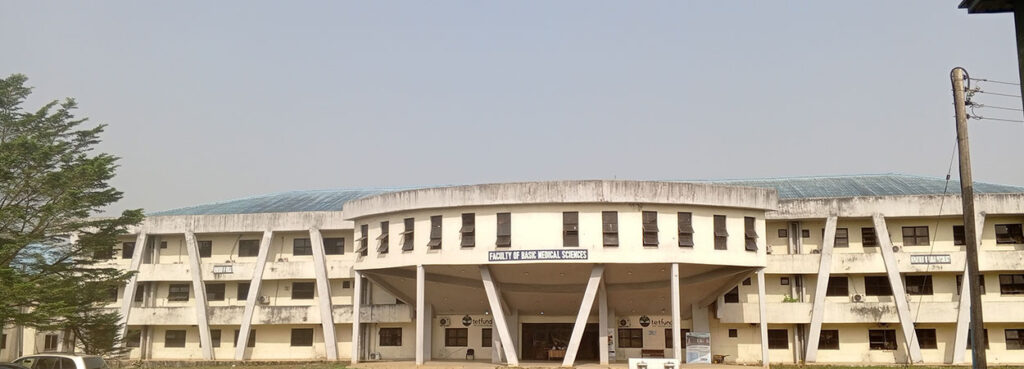
Dean Of Faculty: Prof. Chikwuogo W. Paul
Contact E-mail: chikwuogo.paul@uniport.edu.ng
Contact Phone Number(s): 08035486046
The Faculty of Basic Medical Sciences has grown immensely since its inception as part of the College of Health Sciences in 1979, when it was headed by Professor Alfred Diete-Koki, foremost physiologist. In the early days, the Faculty ran a four Bachelor of Medical Sciences (B.Med.Sc.) programme in Anatomy, Pharmacology and Physiology and in doing so, it was one of only two universities that offered such a programme at the time. Students who graduated with a second honours lower division degree or better, and who made at least a 50% average in anatomy, physiology and pharmacology, qualified to study clinical medicine for another 3 years.
The B.Med.Sc. programme ended in 1989 following a review of the MBBS programme and the adoption of the traditional six year MBBS program, that is offered by nearly all medical schools in Nigeria. Sadly, the Faculty also ceased to exist in the same year as a consequence of the rearrangement of the College’s administrative structure. It is however worthy of note that the now extinct B.Med.Sc. programme produced many of the most illustrious products of the College of Health Sciences, including the many who were employed by the University and who now hold administrative positions in the College and elsewhere in the University.
The Faculty of Basic Medical Sciences was recreated by the Senate of the University of Port Harcourt in February 1999, in compliance with a National Universities Commission directive (Ref UNC/ES/140NO1.56) of July 26, 1989, that required all universities to merge related faculties into colleges for administrative convenience. The new colleges were to be headed by Provosts and the Faculties by Deans, which were equal in stature with Deans of faculties not in colleges. The new Faculty of Basic Medical Sciences comprised four Departments: Anatomy, Biochemistry, Pharmacology and Physiology.
The composition of the Faculty was reviewed by a College committee in March 1999 and expanded to include the Division of Pathology consisting of the Departments of Anatomical Pathology; Chemical Pathology; Haematology, Blood Transfusion and Immunology; and Medical Microbiology and Parasitology. This revised composition was approved by Senate and remains the composition of the Faculty. The First Dean of the reconstituted Faculty was Professor Nelson Brambaifa, assumed office in February 1999. Professor RNP Nwankwoala was Dean between 2001 and 2003. He was succeeded by Professor Omotayo Ebong who was Dean between 2003 and 2005. Professor BC Didia succeeded her and was Dean from 2006 to 2007 when he was elected Provost of the College of Health Sciences. Professor EB Dede served as Dean between 2007 and 2009 and was succeeded in office by Professor DV Dapper who was Dean between 2009 and 2012. Professor HB Fawehinmi was Dean from 2012 to 2014. Professor IM Siminialayi served as Dean between 2014 to 2016 and was succeed in office by Professor CN Nwauche who was the Dean 2016 to 2018 and handed over to the current Dean, Professor AN Chuemere in 2018.
INSTITUTIONAL OBJECTIVES AND QUALITY ASSURANCE STATEMENTS FOR UNDERGRADUATE AND POSTGRADUATE EDUCATION IN THE FACULTY
KNOWLEDGE AND SKILL
At the conclusion of the formal period of training, the graduate:
Should be able to:
ATTITUDE
The graduate should be equipped:
SELF-EDUCATION
The students should be able:
Students of the MBBS programme pass through the Faculty of Basic Medical Sciences in the first four years of their studies. They are taught the pre-clinical courses of Anatomy, Physiology and Biochemistry to Part I MBBS/BDS. They also study Pharmacology and Laboratory Medicine (Pathology).
The latter comprises courses in the following areas of Medicine: Anatomical Pathology, Chemical Pathology, Hematology, Blood Transfusion and Immunology, and Medical Microbiology and Parasitology.
The Institutional Objectives for the MBBS Programme can be found in the prospectus of the College of Health Sciences. The Aims and Objectives of the other programmes are the same as for other under graduate and Graduate Educational Programmes offered in the other Faculties of the University of Port Harcourt.
To read more about the faculty, visit the faculty website
Below are the list of departments offered in the Faculty of Basic Medical Sciences